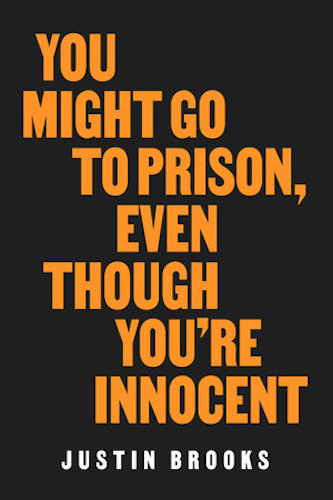Book Review: “You Might Go to Prison, Even Though You’re Innocent” — Believe It
By Bill Littlefield
This is a well-researched and accessible account of how and how often the system locks up the wrong people and keeps them locked up.
You Might Go to Prison, Even Though You’re Innocent by Justin Brooks. 222 pages, University of California Press.
 If you’re Caucasian, rich, and reasonably well-connected, you probably WON’T go to prison, even though you’re innocent. Still, Justin Brooks, the director of the California Innocence Project, has a good point as well as a provocative title for this well-researched and accessible account of how and how often the system locks up the wrong people and keeps them locked up.
If you’re Caucasian, rich, and reasonably well-connected, you probably WON’T go to prison, even though you’re innocent. Still, Justin Brooks, the director of the California Innocence Project, has a good point as well as a provocative title for this well-researched and accessible account of how and how often the system locks up the wrong people and keeps them locked up.
In 10 chapters, Brooks explores and explains various ways in which the criminal justice system has failed people who have not committed the crimes for which they have served time in prison. He saves the most obvious cause of injustice for last in the chapter titled “You Are Poor and/or a Person of Color.” Nobody who’s paid any attention to incarcerations in this country will be surprised that the prison population is far less white than the population of the nation. Black men are locked up at approximately six times the rate of white men. Brooks discusses the “tough on crime” laws that have been partly to blame for this circumstance, but he also writes about the “implicit bias” that leads white judges, juries, police officers, and attorneys to often assume the worst of Black citizens who’ve been accused of committing crimes.
Some of the other chapters do contain surprises. A lot of the alleged “science” that has led to the incarceration of innocent men and women has been debunked, but Brooks points out that on occasion prosecutors are still convincing some judges and juries to pay attention to their alleged experts. One of Brooks’s clients, Bill Richards, served 10 years in prison because a dentist had assured a jury that the bite marks on the victim’s body could only have come from Richards’s teeth. The “science” behind that conclusion has been demonstrated to be bogus. Even the expert witness himself eventually acknowledged that his conclusion was without merit, but it was years before Brooks and his colleagues could navigate the legal thicket between Richards and freedom.
Similar problems can be found with the “science” prosecutors have used to convict people accused of abusing children as well as people charged with arson. What was considered to be legitimate evidence of “shaken baby syndrome” is no longer accepted by people who’ve done their scientific homework. Patterns of damage once thought to prove that the fires had been set have been discovered in homes that burned when brush fires roared through them. The stories of the long incarcerations of people wrongly convicted of these crimes are grim, as are the accounts of people who simply hired — or were assigned — attorneys without the expertise or energy to mount credible defenses. The most bizarre of those cases involved a woman who followed her attorney’s advice to forego a trial and accept a plea bargain. She landed on death row. Some bargain. Brooks and his associates accepted the woman’s case, demonstrated that a circumstance an eye witness had described to the police was impossible, and eventually got Marilyn Mulero out of prison. She’d been incarcerated for 25 years. When Brooks tracked down Mulero’s original attorney, the man admitted that he hadn’t investigated the crime scene. He quit the law after Mulero went to prison and “began studying to be a priest.”
There is much more to You Might Go to Prison, Even Though You’re Innocent than horror stories with long-delayed happy endings. Brooks suggests various ways in which the system can be improved: for example, make sure witnesses looking at line-ups are told the suspect might not be IN the line-up, thereby making it less likely the witness will feel compelled to identify one of the folks who IS there; create rules and penalties making prosecutorial misconduct less likely and more costly; educate everyone involved in the system, including juries, about the difference between an alleged expert’s opinion and “science”; end abusive interrogation techniques designed to wear down suspects until they’ll say anything to bring the process to an end.
To his great credit, Brooks also writes about people the Innocence Project is not designed to help. There are tens of thousands of incarcerated men and women who cannot claim they are not guilty of the crimes of which they’ve been convicted, but who have been cheated, misled, and otherwise victimized by a system committed to getting a conviction rather than establishing the truth of a set of circumstances and achieving a just outcome for all those involved.
Bill Littlefield works with the Emerson Prison Initiative, a program that helps incarcerated men earn a college degree. His most recent novel is Mercy, Black Rose Writing, 2022.
Tagged: California Innocence Project, criminal justice system, Justin Brooks
